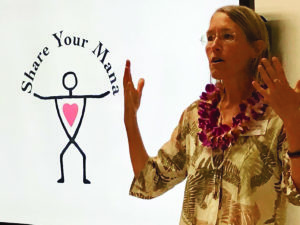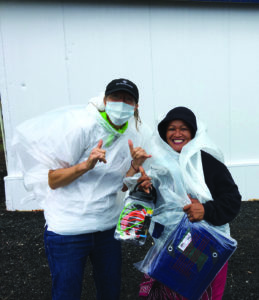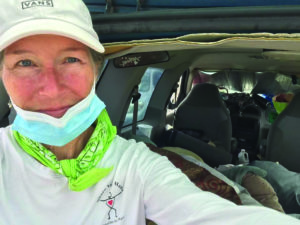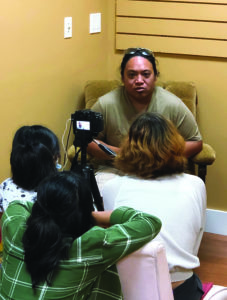
Growing up modestly in a suburb of Chicago, I remember the first time we went camping. I was so excited, because this was a family vacation. My brothers and sisters helped pack the hot dogs and buns, collected our sleeping bags and pillows, and gathered wood for the fire. We were thrilled to eat canned beans! It was an exciting adventure… until the doorbell rang.
This, of course was not camping, even though that’s what we called it. We had a bathroom, electricity, a phone, safety and privacy.
Let’s shift the paradigm. Welcome to a tiny sliver of insight that informs our community fabric. I invite you to walk with me into a poorly studied, and wholly misunderstood and often stigmatized crisis.
Is the term homeless or houseless? The term you chose is an important focal point for lighting a path forward. Determining the nature of these conditions is significant in reimagining community safety for all community members. Understanding the difference in terms allows us to reconsider our approaches and partnerships.

Member Jess and Founder Lisa Darcy
deliver supplies in February 2021.
The term “homeless” is a mainland idea, not a Maui idea. It is an overarching category which can result in harm, no matter how unintentional. The difference has been shared with me over and over from almost all the community members I’ve met. “I am home. Maui is my home. I just don’t have a house,” says Ku‘uipo from her tent. Of Hawaiian descent, she articulates displacement beautifully and with authority.
To get at core needs, the use of language and current context are critical, because the conditions in which many in Maui County and around the world are living need to be accurately portrayed with honesty, integrity and dignity. There are many terms that have emerged to help explain the levels of needs — unhoused, unsheltered, houseless, homeless and housing-insecure. Regardless of the category or term, I’ve seen how emotionally overwhelming — often paralyzing — these conditions are.
started Maui-based nonprofit Share Your Mana (SYM) to meet the needs of moments like these. As an extremely inquisitive and distinctive care provider, I approach every interaction the only way I know how — through the unique lens of those in crisis. It is often quite uncomfortable, messy and painful, and still these raw, genuine interactions always culminate in inspiration.
SYM is driven by reviewing experiences which serve and by possessing the resolve to evolve through reflections on the failures that hinder success. And to improve how we approach restoring a healthy community balance, we need to create the space to move through whatever emotions follow. I call it, “decompressing emotions.”
Most of us understand that by the time someone is living unhoused or unsheltered, there must be multiple categories of need that are overstressed. Without an actual, affordable, safe sleeping inventory, when a slow boil of problems spills over, it is easy to slide into crisis.

There is a common association that those who are living in “subhuman conditions” are dangerous and to be feared. I spent the entire pandemic with hundreds living unhoused, every single day and most nights bringing life-sustaining supplies. I found many grappling with these conditions who also have an amazing ability to manage the negative stereotypes. I have witnessed love and respect alongside deep pain — often, generational pain.
Healing requires dignity, consistency and the concept that no matter why you are where you are, this community believes every person deserves the components of Maslow’s pyramid — physiological needs, safety, love and belonging, esteem and self-actualization.
As a child, there was no way I could understand that camping in our living room was much different than the daily experience of the unhoused, unsheltered, houseless, homeless and housing-insecure. There was a toilet nearby, a refrigerator stocked with food and electricity to light my way. And yet, I still recall my fantasy
— how wonderful it was to “get away.”
Many live in conditions with no toilet or ability to sleep soundly in clean sheets or even a sleeping bag. These conditions exacerbate the situation, often creating a person who is fearful, guarded and even defiant. When you are unable to keep clean, your self-esteem is ripped away. Then decompensating happens — the person’s mental health deteriorates. For the unsheltered, it is an especially traumatic process because it happens in public, for everyone to see.
As we go deeper into 2023, housing resources will no doubt continue to tighten. Only one small financial mishap can sometimes lead to housing insecurity and becoming unhoused. This is a frightening thought for most of us… the stuff of nightmares.
One day, I hope this will not evoke fear, because we have invested in safe sleeping for all residents. My hope for 2023 is that we invest in reframing solutions with safe sleeping in mind, a concept that will uplift talents, abilities and our humanity.
Then we can all sleep better as we see improved policy and actions that help to raise our community dignity.
 “Share Your Mana has helped me in so many ways,” says Darren, who lived in his non-drivable car during the pandemic. “They never let me down no matter what I needed and I needed a lot. Share Your Mana help me mentally, physically and emotionally and has made me a brand new person. Share Your Mana has made me stronger than I ever was. I have seen Lisa do so much for others, so then I joined her advisory committee, becoming one of the leaders to make a better future for the unhoused community. While on the committee, I’ve seen unhoused people become housed and many housed people become unhoused. The cycle will never stop unless we can put a stop to it, change the cycle and initiate action that helps the unhoused community become stronger with the help of state and county officials who want to make a change for the good of the people.”
“Share Your Mana has helped me in so many ways,” says Darren, who lived in his non-drivable car during the pandemic. “They never let me down no matter what I needed and I needed a lot. Share Your Mana help me mentally, physically and emotionally and has made me a brand new person. Share Your Mana has made me stronger than I ever was. I have seen Lisa do so much for others, so then I joined her advisory committee, becoming one of the leaders to make a better future for the unhoused community. While on the committee, I’ve seen unhoused people become housed and many housed people become unhoused. The cycle will never stop unless we can put a stop to it, change the cycle and initiate action that helps the unhoused community become stronger with the help of state and county officials who want to make a change for the good of the people.”


Leave a Reply